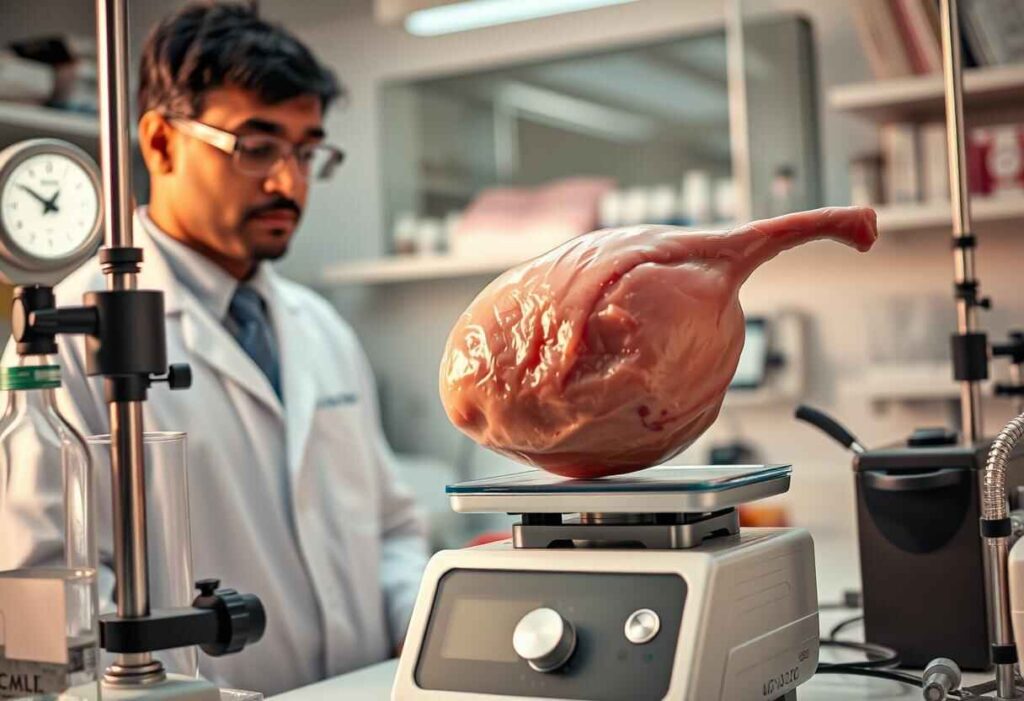The gallbladder is a small but key organ found under the liver in our upper right belly. It holds bile, a juice made by the liver that helps digest fats in the small intestine. But do you know how heavy this tiny organ is?
A regular gallbladder weigh about 2 grams, which is just like a few paperclips! Even though it’s small, it’s still super important. While there might be a bit of difference in size between people, most gallbladders are around the same weight.
The gallbladder looks like a pear and is usually 7 to 10 centimeters long (about 3 inches). Even though it’s small, it can store up to 50 milliliters of bile, like a little reservoir for when we eat fatty foods!
Sometimes, people get gallstones, which are hard pieces of cholesterol or bilirubin that can form in the gallbladder. If gallstones cause pain or other problems, the gallbladder might need to be removed with surgery called a cholecystectomy. But even if you don’t have a gallbladder, your body can still digest fats. It just means the bile goes straight from the liver to the intestine instead of being stored first.
What is the Purpose of the Gallbladder?
Even though it’s tiny, the gallbladder is important for digestion. It stores bile, a yellowish-green fluid made by your liver. Bile helps your body break down fats from food so you can absorb nutrients better. When you eat, especially fatty foods, your gallbladder squeezes and sends bile into your small intestine to help with digestion.

Does the Weight of the Gallbladder Change?
The weight range we talked about earlier is what’s normal for a healthy mature, but it can vary a bit. Here are some things that can affect how much your gallbladder weighs:
- Body size: If you’re bigger, your gallbladder might be a bit heavier. That’s because it needs to store enough bile to help you digest your food, and bigger people usually eat more.
- Overall health: Some health problems can change how heavy your gallbladder is. For example, being overweight or having high cholesterol can cause gallstones to form, which can make your gallbladder inflamed and heavier. On the other hand, some liver problems can make your gallbladder smaller and lighter than normal.
- Diet: What you eat doesn’t directly affect your gallbladder’s weight, but it can affect how healthy it is. Eating lots of unhealthy fats and cholesterol can raise your chances of getting gallstones, which can change your gallbladder weight. But eating a healthy diet with lots of fruits, veggies, and fiber can keep your gallbladder healthy.
Here’s a detailed table on the weight of the gallbladder, including factors that can affect its weight:
| Parameter | Description |
| Normal Weight | The typical weight of a healthy, non-diseased gallbladder ranges from 50 to 100 grams. |
| Size | The gallbladder is usually about 7-10 cm long and 3-4 cm wide. |
| Contents | Contains bile, with volume typically ranging from 30 to 50 mL. |
| Variations in Weight | Weight can increase due to factors such as: |
| – Gallstones | Presence of gallstones can significantly increase the weight. |
| – Inflammation (Cholecystitis) | Inflammation can lead to thickening of the gallbladder wall, increasing its weight. |
| – Bile Sludge | Accumulation of bile sludge or thickened bile can add to the weight. |
| – Tumors or Growths | Tumors or abnormal growths can increase the weight. |
| After Removal (Cholecystectomy) | After surgical removal, the gallbladder typically weighs less due to loss of bile and reduction in inflammation. |
| Factors Influencing Weight | Weight can be influenced by factors such as diet, hydration levels, and underlying health conditions. |
Average Weight of the Gallbladder
The weight of the gallbladder can differ between people, but on average, it’s usually between 30 to 50 grams. But remember, this weight can be affected by different things like how old you are, if you’re a man or a woman, how healthy you are, and if you have any gallbladder problems.
Why Keeping Your Gallbladder Healthy Matters
It’s really important to keep your gallbladder healthy for good digestion. When it works well, it helps your body digest fats and absorb important nutrients. Here are some simple tips to help your gallbladder stay healthy:
- Eat Well: Try to eat lots of fiber, fruits, veggies, and whole grains. Avoid eating too much fatty or processed foods.
- Stay Active: Exercise regularly to keep a healthy weight, lower your chances of getting gallstones, and feel good overall.
- Drink Water: Make sure to drink enough water every day. It helps your digestion work well and stops gallstones from forming.
- Be Careful with Diets: Don’t try crash diets or extreme eating plans. They can make gallstones more likely. Instead, go for gradual and healthy weight loss.
- Check-ups: Visit your doctor regularly to make sure your gallbladder is healthy and to talk about any worries you have.

Gallbladder Disease and Weight Implications
Gallbladder diseases can change the weight and function of the gallbladder. Some common conditions are:
- Gallstones (Cholelithiasis): Gallstones can be as small as a grain of sand or as big as a golf ball. Their size and number can make the gallbladder weigh heavier than normal.
- Cholecystitis: This is when the gallbladder gets inflamed, often because gallstones block the cystic duct. This blockage can make the gallbladder swell and hold more fluid, increasing its weight.
- Acalculous Cholecystitis: This is inflammation of the gallbladder without gallstones. It can still cause swelling and fluid build-up, making the gallbladder heavier.
- Gallbladder Polyps: These are growths on the inside of the gallbladder. Even though they are usually harmless, large or many polyps can make the gallbladder weigh more.
- Gallbladder Cancer: Although rare, cancer in the gallbladder can greatly change its weight and shape. Tumors and inflammation from cancer can make the gallbladder much heavier.
Here’s a table on gallbladder disease and its implications on weight:
| Aspect | Description |
| Gallbladder Disease | Refers to various conditions affecting the gallbladder, including gallstones, cholecystitis, and biliary dyskinesia. |
| Common Types | – Gallstones: Solid particles forming in the gallbladder. |
| – Cholecystitis: Inflammation of the gallbladder, often due to gallstones. | |
| – Biliary Dyskinesia: Abnormal function of the gallbladder or bile ducts. | |
| Impact on Gallbladder Weight | – Increased Weight: Conditions like gallstones or inflammation can increase the gallbladder’s weight. |
| – Decreased Weight: Following treatment, such as the removal of stones or surgery, weight may decrease. | |
| General Weight Implications | – Weight Gain: Some individuals may experience weight gain due to dietary changes or reduced physical activity. |
| – Weight Loss: Others might lose weight due to nausea, vomiting, or dietary restrictions imposed by the disease. | |
| Post-Surgery Weight Changes | – Weight Gain: After gallbladder removal (cholecystectomy), some patients may gain weight due to changes in digestion and diet. |
| – Weight Loss: Others may lose weight due to changes in fat digestion and dietary adjustments post-surgery. | |
| Management and Treatment | – Diet: Low-fat diet is often recommended to manage symptoms and prevent complications. |
| – Surgery: Cholecystectomy (gallbladder removal) is a common treatment for severe cases. | |
| – Medications: To manage pain and prevent further stone formation. | |
| Long-term Implications | – Digestive Changes: Post-surgery, some may experience changes in digestion and nutrient absorption. |
| – Monitoring Weight: Regular monitoring of weight and dietary habits is essential to manage long-term effects. |

